|
|
|
Sort Order |
|
|
|
Items / Page
|
|
|
|
|
|
|
| Srl | Item |
| 1 |
ID:
080680
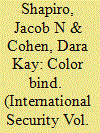

|
|
|
|
|
| Publication |
2007.
|
| Summary/Abstract |
An effective terrorism alert system in a federal government has one central task: to motivate actors to take costly protective measures. The United States' color-coded Homeland Security Advisory System (HSAS) failed in this mission. In federal systems, national leaders cannot compel protective actions by setting an alert level; they must convince constituent governments and private parties that the desired actions are worth the costs. Such beliefs can be generated either by sharing the information behind an alert or by developing enough confidence in the alert system that the government's word alone suffices. The HSAS did neither, largely because it was not designed to generate confidence. Rather, the system's creators assumed that the public would trust the national leadership and believe in the utility of the system's information. Over time, as the HSAS became increasingly perceived as politically manipulated, there was no built-in mechanism to recover confidence in the system. An alternative, trust-based terrorist alert system could solve this problem. Building on the notion of "procedural fairness" from the psychological and legal traditions, this system would retain the political advantages of the HSAS, facilitate greater compliance among the requisite actors, and ameliorate many of the strategic problems inherent in terror alert systems.
|
|
|
|
|
|
|
|
|
|
|
|
|
|
|
|
| 2 |
ID:
133712


|
|
|
|
|
| Publication |
2014.
|
| Summary/Abstract |
A long-standing research tradition on political culture argues that greater support for core liberal values leads to a rejection of destructive political activities and reduced support for violent politics. In this vein, many contemporary analysts of security policy contend that a lack of democratic values in the Middle East promotes the development of violent political organizations. Unfortunately, there have been few direct tests of the hypothesis that an individual's rejection of democratic values correlates with support for militant groups. We conduct such a test in Pakistan using an original 6,000-person provincially representative survey. We find that strong supporters of democratic values are actually more supportive of militant groups and that this relationship is strongest among those who believe that Muslim rights and sovereignty are being violated in Kashmir. This is consistent with the context of Pakistani politics, where many militant groups use the principle of azadi (i.e., freedom and self-determination) to justify their actions. These results challenge the conventional wisdom about the roots of militancy and underscore the importance of understanding how local context mediates the influence of civic culture on political stability and violence.
|
|
|
|
|
|
|
|
|
|
|
|
|
|
|
|
| 3 |
ID:
107920


|
|
|
|
|
| Publication |
2011.
|
| Summary/Abstract |
Most aid spending by governments seeking to rebuild social and political order is based on an opportunity-cost theory of distracting potential recruits. The logic is that gainfully employed young men are less likely to participate in political violence, implying a positive correlation between unemployment and violence in locations with active insurgencies. The authors test that prediction in Afghanistan, Iraq, and the Philippines, using survey data on unemployment and two newly available measures of insurgency: (1) attacks against government and allied forces and (2) violence that kill civilians. Contrary to the opportunity-cost theory, the data emphatically reject a positive correlation between unemployment and attacks against government and allied forces (p < .05 percent). There is no significant relationship between unemployment and the rate of insurgent attacks that kill civilians. The authors identify several potential explanations, introducing the notion of insurgent precision to adjudicate between the possibilities that predation on one hand, and security measures and information costs on the other, account for the negative correlation between unemployment and violence in these three conflicts.
|
|
|
|
|
|
|
|
|
|
|
|
|
|
|
|
| 4 |
ID:
180671
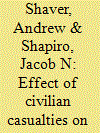

|
|
|
|
|
| Summary/Abstract |
Scholars of civil war and insurgency have long posited that insurgent organizations and their state enemies incur costs for the collateral damage they cause. We provide the first direct quantitative evidence that wartime informing to counterinsurgent forces is affected by civilian victimization. Using newly declassified data on tip flow to Coalition forces in Iraq we find that information flow goes down after government forces inadvertently kill civilians and it goes up when insurgents do so. These results confirm a relationship long posited in the theoretical literature on insurgency but never directly observed, have strong policy implications, and are consistent with a broad range of circumstantial evidence on the topic.
|
|
|
|
|
|
|
|
|
|
|
|
|
|
|
|
| 5 |
ID:
139796


|
|
|
|
|
| Summary/Abstract |
Does improved communication provided by modern cellphone technology affect the rise or fall of violence during insurgencies? A priori predictions are ambiguous; introducing cellphones can enhance insurgent communications but can also make it easier for the population to share information with counterinsurgents and creates opportunities for signals intelligence collection. We provide the first systematic micro-level test of the effect of cellphone communication on conflict using data on Iraq's cellphone network (2004–2009) and event data on violence. We show that increased mobile communications reduced insurgent violence in Iraq, both at the district level and for specific local coverage areas. The results provide support for models of insurgency that focus on noncombatants providing information as the key constraint on violent groups and highlight the fact that small changes in the transaction costs of cooperating with the government can have large macro effects on conflict.
|
|
|
|
|
|
|
|
|
|
|
|
|
|
|
|
| 6 |
ID:
097362


|
|
|
|
|
| Publication |
2010.
|
| Summary/Abstract |
We analyze a seemingly simple question: When should government share private information that may be useful to terrorists? Policy makers' answer to this question has typically been "it is dangerous to share information that can potentially help terrorists." Unfortunately, this incomplete response has motivated a detrimental increase in the amount of information government keeps private or labels "sensitive but unclassified." We identify two distinct types of private information that are potentially useful to terrorists and identify the range of conditions under which sharing each can enhance counterterrorism efforts. Our results highlight the complex trade-offs policy makers face in deciding how much openness is right in a world where protecting the people from terrorists has become a central duty of government.
|
|
|
|
|
|
|
|
|
|
|
|
|
|
|
|
| 7 |
ID:
157513
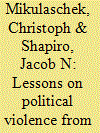

|
|
|
|
|
| Summary/Abstract |
A large literature has emerged in political science that studies the wars in Afghanistan and Iraq. This article summarizes the lessons learned from this literature, both theoretical and practical. To put this emerging knowledge base into perspective, we review findings along two dimensions of conflict: factors influencing whether states or substate groups enter into conflict in the first place and variables affecting the intensity of fighting at particular times and places once war has started. We then discuss the external validity issues entailed in learning about contemporary wars and insurgencies from research focused on the Afghanistan and Iraq wars during the period of US involvement. We close by summarizing the uniquely rich qualitative and quantitative data on these wars (both publicly available and what likely exists but has not been released) and outline potential avenues for future research.
|
|
|
|
|
|
|
|
|
|
|
|
|
|
|
|
| 8 |
ID:
151759
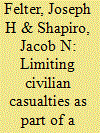

|
|
|
|
|
| Summary/Abstract |
Military commanders in wartime have moral obligations to abide by international norms and humanitarian laws governing their treatment of noncombatants. How much risk to their own forces they must take to limit harm to civilians in the course of military operations, however, is unclear. The principle of proportionality in the law of armed conflict all but necessitates that they make a utilitarian calculation: potential harm to civilians must always be balanced against military value when considering actions that could hurt innocents. In asymmetric conflicts, such as most counterinsurgencies, information flows, collaboration, and ultimately the support of the local population can be key to achieving strategic objectives. Thus, limiting casualties to noncombatants and other actions that alienate the population in these types of conflicts is a key part of a winning strategy. The concept of “courageous restraint” was created to express this principle to NATO and U.S. forces fighting in Afghanistan.
|
|
|
|
|
|
|
|
|
|
|
|
|
|
|
|
| 9 |
ID:
112510


|
|
|
|
|
| Publication |
2012.
|
| Summary/Abstract |
Terrorist groups repeatedly include operatives of varying commitment and often rely on a common set of security-reducing bureaucratic tools to manage these individuals. This is puzzling in that covert organizations are commonly thought to screen their operatives very carefully and pay a particularly heavy price for record keeping. The authors use terrorist memoirs and the internal correspondence of one particularly prominent group to highlight the organizational challenges terrorist groups face and use a game-theoretic model of moral hazard in a finitely sized organization to explain why record keeping and bureaucracy emerge in these groups. The model provides two novel results. First, in small heterogeneous organizations longer institutional memory can enhance organizational efficiency. Second, such organizations will use worse agents in equilibrium under certain conditions. The core logic is that in small organizations the punishment strategies that allow leaders to extract greater effort are credible only when operatives can identify and react to deviations from the leaders' equilibrium strategy. This dynamic creates incentives for record keeping and means that small organizations will periodically use problematic agents in equilibrium as part of a strategy that optimally motivates their best operatives.
|
|
|
|
|
|
|
|
|
|
|
|
|
|
|
|
| 10 |
ID:
163137
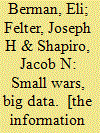

|
|
|
|
|
| Publication |
Princeton, Princeton University Press, 2018.
|
| Description |
xxi, 386p.hbk
|
| Standard Number |
9780691177076
|
|
|
|
|
|
|
|
|
|
|
|
Copies: C:1/I:0,R:0,Q:0
Circulation
| Accession# | Call# | Current Location | Status | Policy | Location |
| 059568 | 355.343/BER 059568 | Main | On Shelf | General | |
|
|
|
|
| 11 |
ID:
153620


|
|
|
|
|
| Summary/Abstract |
Contemporary development assistance often takes the form of subcontracted state-building. Foreign donors hire for-profit firms to provide services and to improve or create institutions in developing countries, particularly those experiencing internal conflict. This arrangement creates two counterproductive dynamics: first, it introduces agency problems between donors, recipient states, subcontractors, and citizens; and second, it undermines the long-run development of domestic bureaucratic capacity by creating disincentives for the host government to invest. These dynamics hinder, rather than foster, the legitimacy of state institutions. This paper summarizes trends in external support to state-building since the 1970s and illustrates subcontracted state-building with examples from Colombia.
|
|
|
|
|
|
|
|
|
|
|
|
|
|
|
|
| 12 |
ID:
113673


|
|
|
|
|
| Publication |
2012.
|
| Summary/Abstract |
Why did violence decline in Iraq in 2007? Many policymakers and scholars credit the "surge," or the program of U.S. reinforcements and doctrinal changes that began in January 2007. Others cite the voluntary insurgent stand-downs of the Sunni Awakening or say that the violence had simply run its course with the end of a wave of sectarian cleansing; still others credit an interaction between the surge and the Awakening. The difference matters for policy and scholarship, yet this debate has not moved from hypothesis to test. An assessment of the competing claims based on recently declassified data on violence at local levels and information gathered from seventy structured interviews with coalition participants finds little support for the cleansing or Awakening theses. Instead, a synergistic interaction between the surge and the Awakening was required for violence to drop as quickly and widely as it did: both were necessary; neither was sufficient. U.S. policy thus played an important role in reducing the violence in Iraq in 2007, but Iraq provides no evidence that similar methods will produce similar results elsewhere without local equivalents of the Sunni Awakening.
|
|
|
|
|
|
|
|
|
|
|
|
|
|
|
|
| 13 |
ID:
078288
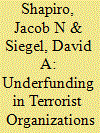

|
|
|
|
|
| Publication |
2007.
|
| Summary/Abstract |
A review of international terrorist activity reveals a pattern of financially strapped operatives working for organizations that seem to have plenty of money. To explain this observation, and to examine when restricting terrorists' funds will reduce their lethality, we model a hierarchical terror organization in which leaders delegate financial and logistical tasks to middlemen, but cannot perfectly monitor them for security reasons. These middlemen do not always share their leaders' interests: the temptation exists to skim funds from financial transactions. When middlemen are sufficiently greedy and organizations suffer from sufficiently strong budget constraints, leaders will not fund attacks because the costs of skimming are too great. Using general functional forms, we find important nonlinearities in terrorists' responses to government counter-terrorism. Restricting terrorists' funds may be ineffective until a critical threshold is reached, at which point cooperation within terrorist organizations begins to break down and further government actions have a disproportionately large impact
|
|
|
|
|
|
|
|
|
|
|
|
|
|
|
|
| 14 |
ID:
093025
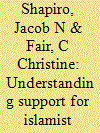

|
|
|
|
|
| Publication |
2009.
|
| Summary/Abstract |
Islamist militancy in Pakistan has long stood atop the international security agenda, yet there is almost no systematic evidence about why individual Pakistanis support Islamist militant organizations. An analysis of data from a nationally representative survey of urban Pakistanis refutes four influential conventional wisdoms about why Pakistanis support Islamic militancy. First, there is no clear relationship between poverty and support for militancy. If anything, support for militant organizations is increasing in terms of both subjective economic well-being and community economic performance. Second, personal religiosity and support for sharia law are poor predictors of support for Islamist militant organizations. Third, support for political goals espoused by legal Islamist parties is a weak indicator of support for militant organizations. Fourth, those who support core democratic principles or have faith in Pakistan's democratic process are not less supportive of militancy. Taken together, these results suggest that commonly prescribed solutions to Islamist militancy-economic development, democratization, and the like-may be irrelevant at best and might even be counterproductive.
|
|
|
|
|
|
|
|
|
|
|
|
|
|
|
|
|
|
|
|
|